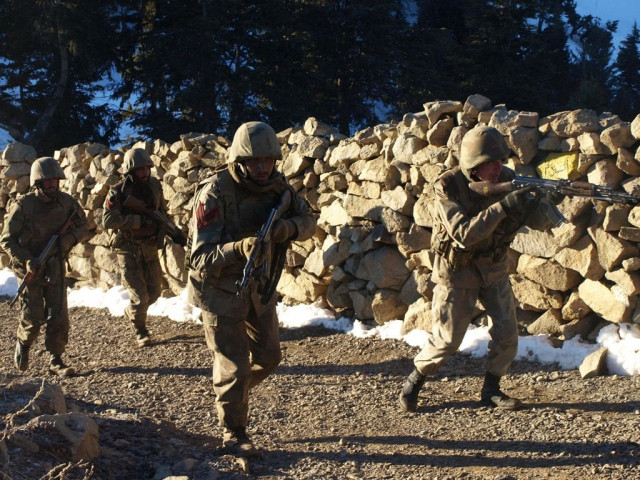Path to recovery: War-on-terror losses register 33% decline
Reduction in drone attacks also helped in lowering direct losses to infrastructure.

In the last 13 years, Pakistan has incurred total losses of $102.5 billion. PHOTO: AFP/FILE
Even though the country suffered $6.7 billion in losses due to the war on terror in the outgoing fiscal year, it is still one-third less than the previous financial year, which highlights the gradual recovery on the security front.
The fiscal year 2013-14 was the third consecutive year when there was a reduction in losses due to security over the preceding year, indicated the Economic Survey of Pakistan, which was launched on Monday.
In the last 13 years, Pakistan has incurred total losses of $102.5 billion.
The US-sponsored drone attacks have drastically reduced, which also helped in lowering the direct losses to infrastructure and human lives, according to defence experts.
“Pakistan continues to pay a heavy price, both in economic and security terms. Moreover, a substantial portion of precious national resources, both men and material, have been diverted to address the emerging security challenges,” stated the survey.
After dropping it last year, the Pakistan Muslim League-Nawaz government added a chapter on the impact of war in Afghanistan and the ensuing terrorism on Pakistan’s economy. The chapter briefly describes the direct and indirect losses that the country has sustained so far due to the war against terrorism, started after the 9/11 terrorist attacks on the United States.
During the last 13 years, the direct and indirect cost incurred by Pakistan due to incidents of terrorism amounted to $102.5 billion or Rs8.3 trillion, according to the survey. The total cost is twice more than the next year’s proposed total budget of Rs3.9 trillion.
The cost has been worked out by an inter-ministerial committee, having representation of the ministries of finance, interior, foreign affairs, commerce and inter-provincial coordination.
The US embassy in Pakistan has long been opposing Pakistan’s decision to publish the cost of terrorism due to differences over methodology used to work out the price, according to officials.
According to the survey, Pakistan sustained $6.7 billion losses in the outgoing fiscal year, which were $3.3 billion or 33% less than the losses sustained during the preceding year. According to the survey, as against the estimated $4.7 billion losses in the previous fiscal year, the government estimated no losses in the current fiscal on account of privatisation opportunities.
There was also a reduction in losses on account of physical infrastructure, as the cost went down to $437.4 million from $777 million. The cost of compensation to the affected population also decreased from $21 million to $14 million.
The cost of lost opportunities for exports reduced from $730 million to $323.1 million. But the cost of foreign investment went up from $210 million to $3.3 billion in the outgoing fiscal year. The cost of loss of industrial output decreased from $308.5 million to $129.6 million. The losses on account of less tax collection decreased from $2.4 billion to $1.7 billion.
The survey stated that this situation has disrupted Pakistan’s normal economic and trading activities, which not only resulted in higher costs of business but also created disruptions in the production cycles, resulting in significant delays in meeting export orders around the globe.
Moreover, Pakistani products have gradually lost their market share to competitors and economic growth has slowed down, which has also affected revenue collection.
Published in The Express Tribune, June 3rd, 2014.



















COMMENTS
Comments are moderated and generally will be posted if they are on-topic and not abusive.
For more information, please see our Comments FAQ